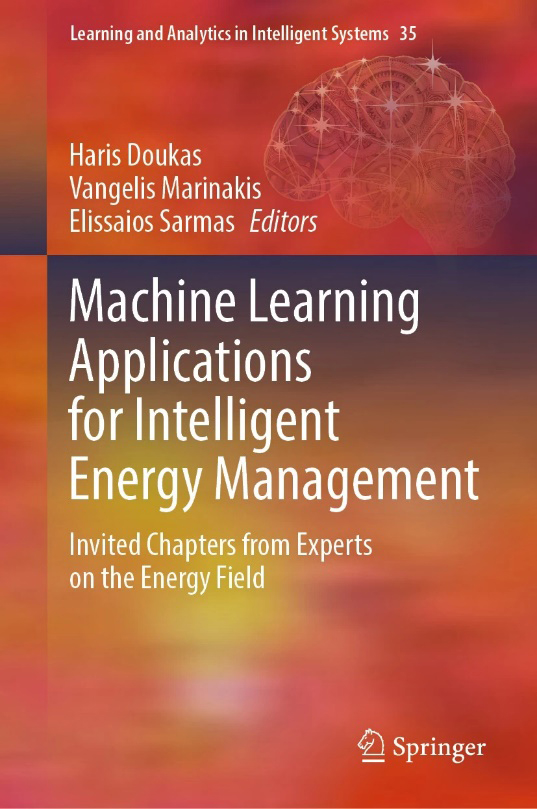Book Review

Machine Learning Applications for Intelligent Energy Management
–
Invited Chapters from Experts on the Energy Field
Editors: Haris Doukas; Vangelis Marinakis; Elissaios Sarmas
Springer 2024, pp. 226, ISBN 978-3-031-47908-3
Vol. 35 in Springer Book Series entitled
Learning and Analytics in Intelligent Systems
(https://www.springer.com/series/16172)
Undoubtedly, human-caused climate change and global warming pose a serious threat to human health and well-being and an existential risk to humanity [1]. Governments around the World, including the European Union, have identified this threat, and are urgently addressing it [2].
The first step taken is to recognize that the main contributor to climate change lies in the use of fossil fuels as energy source, which causes ever rising emissions of carbon dioxide (CO2) and other greenhouse gasses [3]. Unfortunately, reducing the emissions of these gasses is not an easy task as projections indicate that energy consumption will continue to grow well into the foreseeable future and may exceed 250.000 TWh in the year 2050 [4].
If the trend of increasing energy consumption cannot be reverted, how can increasing emissions of greenhouse gasses be slowed down? It appears that two directions of action can be followed, namely (1) transitioning from fossil fuel (oil, natural gas, or carbon)-based energy production to renewable and environmentally friendlier energy sources, such as solar and wind energy, hydrogen, or lithium-ion batteries, and (2) marshalling up and exploiting important streamlined technologies, such as artificial intelligence, big data analytics, internet of things and blockchains.
To date, about 83% of consumed energy is still coming from fossil fuels, while the use of environmentally friendlier sources of energy is rising at a slower-than-required pace [4]. On the other hand, available powerful methodologies of streamlined technologies can significantly contribute towards intensifying efforts, accelerating energy transition, and getting all energy stakeholders actively involved when decisions are made regarding energy production, distribution, and management.
Haris Doukas, Vangelis Marinakis and Elissaios Sarmas, three outstanding researchers in the disciplines of decision making and energy policy designing, identified a gap in the literature on the use of the most advanced technologies in the energy sector. They undertook the difficult task to verse the scientific community on the most recent relevant advances and they summoned several well-known researchers in this area to author chapters on various related topics. The outcome of this effort is a high-quality book on Machine Learning Applications for Intelligent Energy Management.
Essentially, the book addresses both methodologies that provide artificial intelligence-empowered analytics of energy data and methodologies towards artificial intelligence-empowered application development. A preamble and seven chapters guide the readers on understanding and developing a wide variety of stakeholder-tailored analytic services that streamlined artificial intelligence and optimization algorithms can provide for a series of demanding problems in the energy sector.
I read the book with great interest and found that Doukas, Marinakis and Sarmas have done an excellent job. I am certain that the book will be particularly useful to both experts and newcomers to the energy discipline, as it constitutes an extensive reference source for a wide variety of problems encountered in the energy sector and offers both state-of-the-art knowledge and guidance towards practical skill development.
I congratulate the editors for their superb job and recommend this book to all readers, whether they are interested in directly applying the proposed methodologies on practical problems in their work and research or they simply wish to get informed on this important sector.
April 2024
Prof.-Dr. Efthimios Alepis
University of Piraeus
Greece
References
[1] | https://climate.mit.edu/ask-mit/why-do-some-people-call-climate-change-existential-threat. |
[2] | Paris agreement. Report of the Conference of the Parties to the United Nations Framework Convention on Climate Change (21st Session, 2015: Paris). Retrieved December, volume 4, 2017 (https://unfccc.int/process-and-meetings/the-paris-agreement). |
[3] | |
[4] | https://www.theworldcounts.com/challenges/climate-change/energy/global-energy-consumption. |



